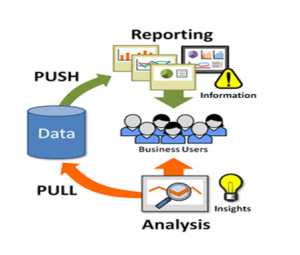Differences between Reporting and Analysis – Concepts
|
Definition 1.The process of organizing data into informational summaries in order to monitor how different areas of a business are performing. |
Definition 1.The process of exploring data and reports in order to extract meaningful insights, which can be used to better understand and improve business performance. |
|
2.Reporting translates raw data into information |
2.Analysis transforms data and information into insights. |
|
3.Good reporting should raise questions about the business from its end users |
3.The goal of analysis is to answer questions by interpreting the data at a deeper level and providing actionable recommendations |
|
4.Reporting shows you what is happening |
4.Analysis focuses on explaining why it is happening and what you can do about it. |
|
Tasks |
|
|
5.Reporting: Building, configuring, consolidating, organizing, formatting, and summarizing. |
5.Analysis: focuses on different tasks such as questioning, examining, interpreting, comparing, and confirming. |
|
Outputs/Approach |
|
|
6.Reporting follows a push approach |
6.Analysis follows a pull approach |
|
7.Reports are pushed to users who are then expected to extract meaningful insights and take appropriate actions for themselves (i.e., self-serve).
|
7.Particular data is pulled by an analyst in order to answer specific business questions.
8.Types |
Approach of Reporting and Analysis

Best Open Source Business Intelligence Software Helical Insight is Here

